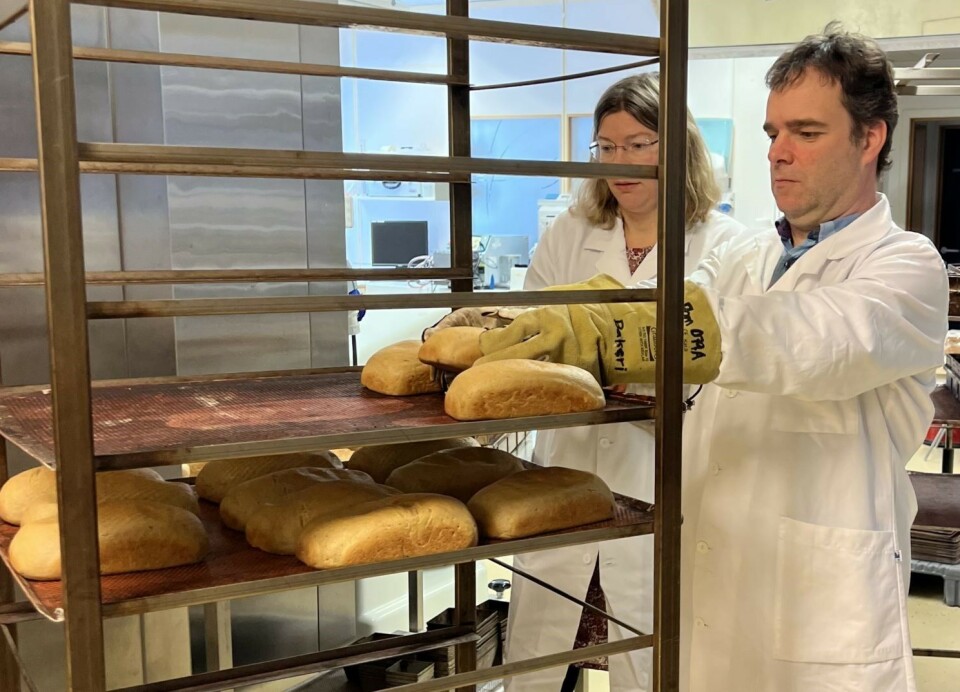THIS CONTENT IS BROUGHT TO YOU BY Nofima The Norwegian Institute of Food, Fisheries and Aquaculture Research - read more

Researchers have developed a bread that can prevent diabetes and cardiovascular diseases
The bread has a high content of the dietary fibre beta-glucan.
Ten years ago, researchers at Nofima had the idea of developing a bread with a high content of the dietary fibre cereal beta-glucan. This was supposed to be a healthier bread, which can prevent diabetes and cardiovascular diseases.
The bread and the recipe have now been fully developed – and it tastes good.
A dietary fibre
It is beta-glucan that makes this bread healthier than most other breads. A special type of beta-glucan is found in oats and barley. It is a type of dietary fibre that can reduce levels of harmful cholesterol and curb the rise in blood sugar after a meal.
“What we're doing is expanding the range of foods that can have cereal beta-glucan as an ingredient. The goal is to tempt more people to eat healthier. The bread we have developed looks like a typical loaf, but it contains a significant amount of beta-glucan. The idea is that the foods we develop will have a real health effect,” senior scientist Simon Ballance at Nofima says.
Several technical challenges in the baking process
The researchers and bakers have worked together in Nofima's test bakery. They have baked bread with a type of oat flour that is rich in beta-glucan.
The problem is that such bread dough usually becomes sticky and gets stuck in the equipment. Beta-glucan can also be rapidly broken down during the baking process without special measures.
Nofima's master baker Fredrik Andresen has tested several baking techniques and different types of equipment. He confirms that achieving a good dough with the desired health properties has presented several technical challenges in baking.

The baking process is quite demanding, so it is not something everyone could tackle in the household kitchen. What's more, oat flour enriched with beta-glucan is not currently available in today's grocery stores.
The bread has been baked and tested in a large clinical trial in Europe.
“The bread qualifies for the health claims of reduced cholesterol and reduced blood sugar rise after meals. We are now investigating whether bread also has positive long-term effects on blood sugar levels,” Nofima scientist Anne Rieder says.
Could replace the bread you eat today
The researchers are trying to make a difference by starting with something most of us eat every day, rather than trying to control what you eat.
“Our intention is for you to replace the bread you eat today with a healthier bread that tastes quite similar to several breads available on the market," says Ballance.
He explains that it is difficult to get most people to eat enough of a single food to produce a lasting health effect. But with bread, this is possible because in Norway, we consume so much bread daily.
A natural food additive
It may be possible to use isolated and thus pure beta-glucan as a more natural additive with functional properties. For example, as a thickener and stabiliser.
This can replace other additives that consumers do not want in their food. Ready-made mayonnaise is an example of a product that can be enriched with beta-glucan. It can prevent the mayo from separating when stored in your refrigerator.
“As of today, beta-glucan is not sold in pure form for use as a more natural food ingredient, and the industry is uncertain whether the market is large enough. However, consumers want more natural additives, and beta-glucan would be a good alternative,” Ballance says.
He further explains that it is the thickening properties that make beta-glucan beneficial for health.
Research suggests that the beta-glucan you ingest makes the fluids in the small intestine more viscous. This blocks the absorption of substances used to form cholesterol or the absorption of glucose, which increases blood sugar.
Large beta-glucan molecules are best
For beta-glucan to have the desired health effect and properties as a thickener, the molecules in the dietary fibre must also have a certain size or molecular weight. Additionally, it must be present in the food in a certain amount.
“It's essential to have accurate and standardised measurement methods for the molecular weight of beta-glucans,” says Ballance.
In this area, Nofima scientists have established a pan-European comparison of different measurement methods through the strategic SUSHEATH programme.
“We found that many methods are well suited, but there were also some that gave misleading results. The common feature is that all the methods are demanding, and require special equipment and expertise,” Ballance concludes.
References:
Ballance et al. Inter-laboratory analysis of cereal beta-glucan extracts of nutritional importance: An evaluation of different methods for determining weight-average molecular weight and molecular weight distribution, Food Hydrocolloids, vol. 127, 2022. DOI: 10.1016/j.foodhyd.2022.107510
Revheim et al. The acute effect of a β-glucan-enriched oat bread on gastric emptying, GLP-1 response, and postprandial glycaemia and insulinemia: a randomised crossover trial in healthy adults, Nutrition & Metabolism, vol. 21, 2024. DOI: 10.1186/s12986-024-00789-w
Rieder et al. 'At a high dose even partially degraded beta-glucan with decreased solubility significantly reduced the glycaemic response to bread', Food & Function, 2019. DOI: 10.1039/c8fo02098a (Abstract)
Rieder, A. & Ballance, S. 'Cereal beta-glucan and glycaemic response', BakingEurope, 2019.

This content is paid for and presented by Nofima The Norwegian Institute of Food, Fisheries and Aquaculture Research
This content is created by Nofima's communication staff, who use this platform to communicate science and share results from research with the public. Nofima is one of more than 80 owners of ScienceNorway.no. Read more here.
More content from Nofima:
-
Red algae grown in wastewater from fish-farming facilities could become sustainable salmon feed
-
Pumpkins are good for more than just Halloween decorations
-
This is how temperature affects a salmon's health and growth
-
Study: Omega-3 and zinc is a powerful duo for salmon
-
Fish may turn yellow if frozen too fresh
-
Is it better if food is packaged in plastic or paperboard?






































